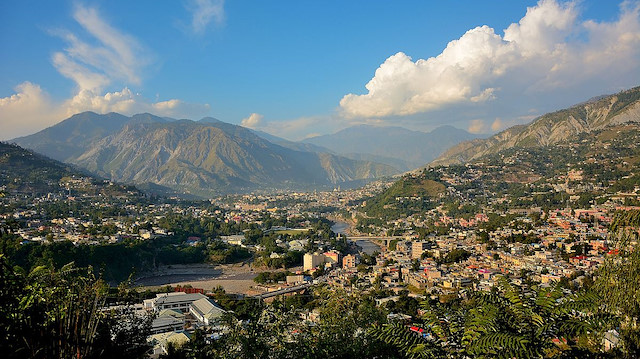
Decision critized as ‘confusing, contradictory, politically motivated’
The decision to open Indian-administered Kashmir for tourists amid a fresh coronavirus lockdown in the Muslim-majority state is being met with skepticism.
Gowhar Geelani, a political commentator, told Anadolu Agency that the chronology of several government orders issued since July 4 demonstrates the government has reasons “other than health concerns of Kashmiris" behind these orders.
Beginning July 21, 500 Hindu pilgrims a day would be allowed to visit the Himalayan cave shrine of Amarnath in Kashmir for the next three weeks.
But early this month, Geelani said, the government issued an order prohibiting all “political, social, academic and religious functions and other large gatherings and congregations” in Kashmir.
This was followed by an order on July 8 to open parks for the public. The date coincides with the anniversary of militant commander Burhan Wani for which the pro-freedom leadership had called a strike.
On July 12, the local administration issued two simultaneous orders; lockdown in parts of Srinagar and allowing tourists to travel by air to the scenic Himalayan region.
"Add to these events the upcoming first anniversary of Aug. 5, when Kashmir was stripped of special political status, one can clearly see a pattern. They create false COVID-19 alarms to pave way for these contradictory and hypocritical diktats. Is coronavirus religion-specific? If a pilgrimage of one religious group is okay, why are other gatherings prohibited?” Geelani said.
Sheikh Ashiq, who is president of the biggest trade body, Kashmir Chamber of Commerce and Industry told Anadolu Agency these orders have “created a lot of confusion”.
“People are bewildered. Many told me that even the areas not notified as trouble spots in the new order were out of bounds for people. The government must come clear on these orders,” said Ashiq.
“I wonder how the government expects tourism to work under a lockdown,” he said.
- 'Double standards'
The government’s announcement to allow limited tourist activity in Kashmir also raised eyebrows because hours before the order, officials had asked local tourists to immediately vacate Pahalgam, one of the most visited tourist spots in Kashmir.
“A tourist is a tourist, be it local or someone from outside,” said Ashiq. “You can’t have two sets of standards for the two. The abruptness of the announcement in Pahalgam was confusing.”
The government order says hotel owners will arrange for local travel of a tourist. Pending the results of the COVID-19 test, a tourist has to stay in a pre-booked hotel and a COVID-19 positive tourist would be admitted to local health facilities.
“This is absurd. I have to arrange for the travel of a tourist while my local taxi driver would face hassles and security barricades while driving on Srinagar roads without permission. Why would I risk hosting a tourist until his test results are out? And if a spike in coronavirus cases has necessitated a lockdown, why burden healthcare with patients from outside?” said Ali Muhammad Dar, a hotelier in Srinagar.
Ashok Kaul, a representative of the ruling Bharatiya Janata Party, told Anadolu Agency that while the lockdown was necessitated by a rise in the number of virus cases, the decision to restart tourism activities was taken keeping in view the local economy.
"There is nothing political in this. You have to give work to some hands. You can't lock down everything," he said.
Tourist arrivals declined sharply after India scrapped Kashmir’s autonomy last year. In the run-up to the decision, the government had asked tourists and pilgrims to leave Kashmir. The advisory was withdrawn later.
Kashmir has been a popular tourist destination but because of the three-decade-long insurgency, many countries have issued advisories discouraging their citizens from traveling to Kashmir.
- Disputed region
Kashmir is held by India and Pakistan in parts and claimed by both in full. A small sliver of Kashmir is also held by China.
Since they were partitioned in 1947, the two countries have fought three wars -- in 1948, 1965, and 1971 -- two of them over Kashmir.
Some Kashmiri groups in Jammu and Kashmir have been fighting against the Indian rule for independence or unification with neighboring Pakistan.
According to several human rights organizations, thousands of people have been killed in the conflict since 1989.
Hello, the comments you share on our site are a valuable resource for other users. Please respect other users and different opinions. Do not use rude, offensive, derogatory, or discriminatory language.
The floor is all yours.








